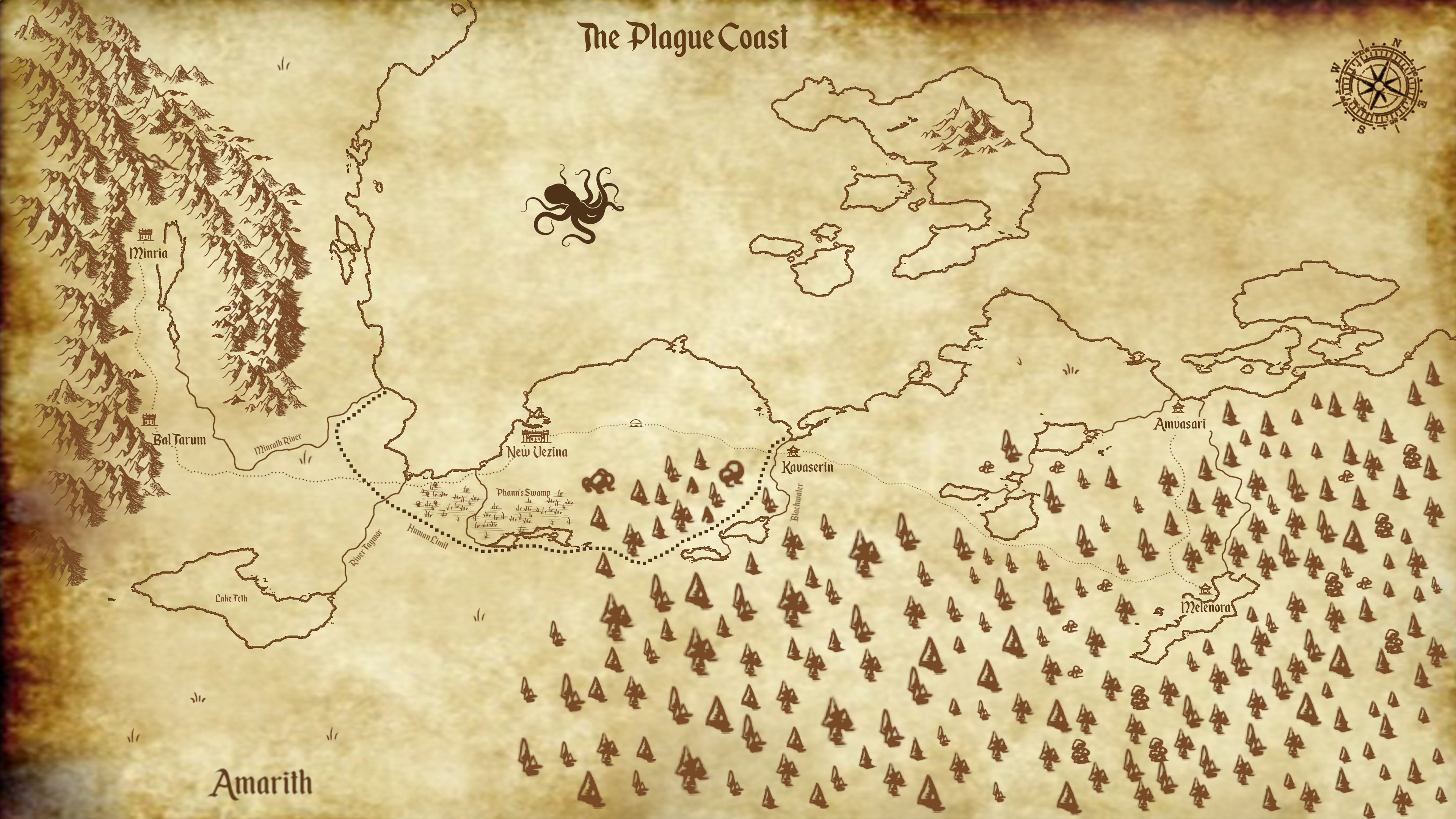Amarith
The large island of Amarith is split between the mostly mountainous north west inhabited by dwarves and the forested south east home to the elves. Many years ago, humans crossed the sea and established a settlement called New Vezina on the coast of Amarith to take advantage of the rich fishing grounds off shore. Initially the dwarves and elves raided the settlement but eventually reached a truce with the humans because of the value of New Vezina as a trading post among the various races. In the truce, the humans agreed to have no king or lord and to restrict their occupation to one days walk from where the White River meets the sea. As a result of the truce the town of New Vezina is effectively ruled by a council of guild masters.
The city of New Vezina is built on the ruins of a dwarven city that was decimated by a plague and abandoned centuries ago. Because of the plague, the dwarves were willing to cede the area to the humans. It is also the reason the area is named “The Plague Coast”. Many current buildings are built on dwarven foundations, some extending far underground.
What started as a small fishing outpost has now grown into a rich city state acting as a trading gateway between the elves and dwarves of Amarith and the humans and other races off island. Humans primarily populate the city, but there are some elves and dwarves, and even a smattering of other races. The region is densely settled since all the human occupation must fall within about 25 miles from the harbor. There is some farming, and fishing is still significant, but the traders and artisan guilds generate the real wealth.
Political
New Vezina is ruled by the guilds. Each guild is headed by a guild master, and they collectively form the Guild League. The League manages the city finances, enacts laws, and through the Harbor Watch maintains order.
The Guild League meets at the Council House, the nearest thing to a palace in New Vezina. Every six months the twenty-five guild masters elect a Guild Secretary. Although it is an innocuous title, it is a very powerful role with the right to propose or defer legislation and appoint office holders such as the Harbor Master. The political struggle to obtain the title can be vicious.
All citizens must join a guild upon reaching adulthood, even if only to pay taxes. Visitors must also join a guild after a month or leave the region. Typically, adventurers would join the Harbor Watch. Mages might join the alchemists or scribes.
Military
Due to lack of a noble class, and distrust between the various guilds, military, or rather policing still reports to the Harbor Master as chief of the Harbor Watch. The Harbor Watch consists of:
- The Navy – Acts as a coast guard, performing rescues and preventing petty piracy. Commanded by the Captain.
- The Dock Workers – Load and unload ships, collect tariffs and taxes. Led by the Dock Chief.
- The Constabulary – General policing of the city and immediate surroundings. Headed by the Sheriff.
Economic
What started as a fishing outpost has now grown into a large city-state including a bustling harbor, warehouses, workshops, and a sprawling market.
Almost all economic activity is regulated by the guilds, and they fiercely protect their power. While technically a new guild can be established, it has not happened in generations. Even those outside the law like brothel owners and drug dealers gain a measure of respectability by joining the inn keeps and apothecaries.
Each guild will have a guildhall where the guild is regulated, training may be offered, and meetings and celebrations are held.
Guilds
- Alchemists and apothecaries
- Armorers, locksmiths, and finesmiths
- Brewers, distillers, and vintners
- Calligraphers, scribes, and scriveners
- Carpenters, roofers, and plasterers
- Cartographers, surveyors, and chart-makers
- Cobblers and shoemakers
- Cooks and bakers
- Glassblowers and glaziers
- Jewelers and gem cutters
- Leatherworkers, skinners, and tanners
- Masons and stonecutters
- Painters, limners, and sign-makers
- Potters and tile-makers
- Shipwrights and sailmakers
- Smiths and metal-forgers
- Tinkers, pewterers, and casters
- Wagon-makers and wheelwrights
- Weavers and dyers
- Woodcarvers, coopers, and bowyers
- Inn keeps, bar staff
- Entertainers
- Moneychangers and bankers
- Fishermen
- Farmers
The Harbor Watch is treated like a guild for taxation purposes, but is an arm of the Guild League and has no representation.
Religion
The Deities of the Forgotten Realms are revered in New Vezina. By far the most worshipped is Waukeen, goddess of trade who has supplanted the fisherman’s Umberlee, goddess of the sea. Also with significant representation is Gond, god of craft.
Social
Communities tend to be focused around the guild, roughly half of all marriages are between two members of the same guild. The guilds hold festivals for their members, provide training, look after the destitute etc.
Some events are city wide like the holy days of Wakeen, and Founder’s Day, the anniversary of the treaty between the humans, elves, and dwarves.
Elves
Elves tolerate humans, although they look down on them as erratic and short lived. A small minority thinks they should be removed from Amarith, with elven arrows if necessary. Humans are viewed with suspicion when encountered outside New Vezina.
Most worship Silvanus, god of wild nature or Mielikki, goddess of forests.
Dwarves
Dwarves generally like humans since they provide an outlet for the goods they produce and a source for materials they cannot mine locally.
They worship Gond, god of craft.
